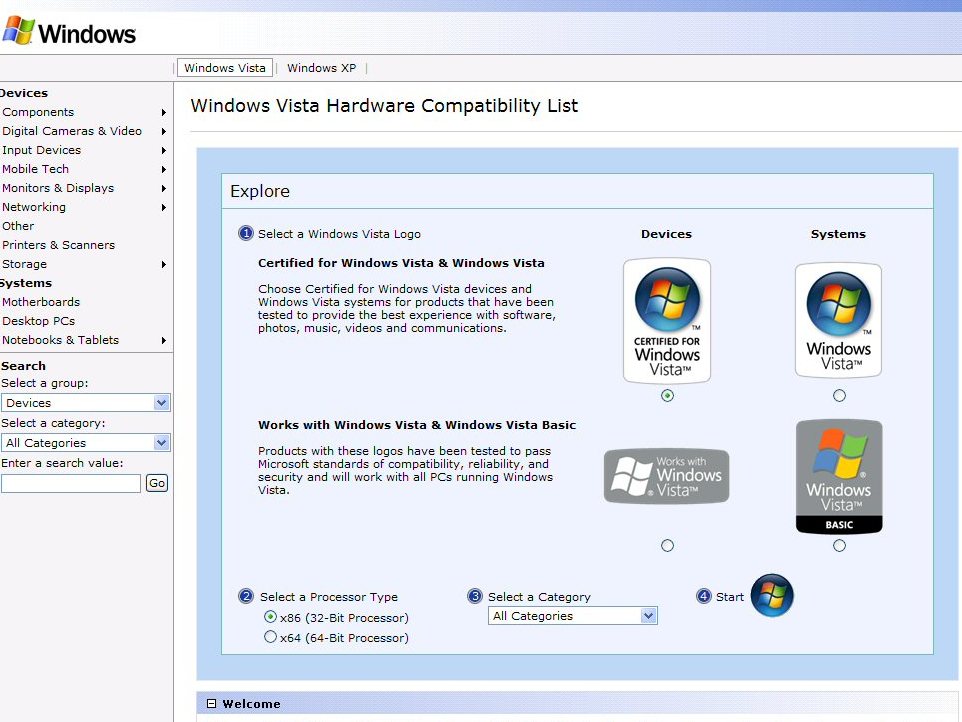Hardware and Windows Vista: 128 Days Later
We snapshot the state of Vista hardware compatibility

There's a certain level of masochism required to be an early adopter. When it comes to a new operating system, we know it's going to be painful. Hell, we've only just got used to having a stable build of the previous one. And yet we still take great delight in begging, borrowing or stealing a copy to moan about how it doesn't work with any of our kit.
With Windows Vista , though, things really should have been different. Manufacturers had over five years to prepare, and a good few months after the second beta to start putting together drivers. But as launch day approached, there were still important drivers missing for our hardware.
Possibly the most iconic of these was regarding Microsoft's Zune player, and its total incompatibility with Vista. Bill patched that one pretty fast, but not before giving us something to chuckle over for a few days. Apple was similarly quick to find fault, announcing with glee that iTunes was crippled and your iPod would explode if you ejected it, and therefore no one should buy Vista.
Thankfully, both companies managed to put bickering aside for long enough to release their own respective patches. So other than the fact that iTunes refuses to look anything like a Vista application, the giants are at peace once again.
Casualties
Vista's biggest casualty has been Creative . Microsoft's decision to remove the DirectSound hardware layer has meant that owners of EAX-enabled hardware have lost surround sound in many games. Creative has worked hard to write a fix for DirectSound/EAX games that translates instructions to the open-source OpenAL format. Called Alchemy , the software works but it's not entirely transparent; you'll also need the set list of supported titles. It's also only compatible with Creative's latest line of X-Fi cards, so Audigy owners are out of luck - for the moment, at least.
Microsoft isn't about to let all this ruin its image, though. It's learnt some valuable lessons from XP about compatibility. And, in order to maintain credibility, it has had to do the unthinkable: get in every piece of hardware released in the last few years and test it to destruction.
The message is simple: those buying hardware that has been awarded a 'works with' or a 'certified for' Windows Vista badge will have a good experience. Those purchasing uncertified kit have a reasonable chance of it deleting all their files, melting their motherboard and/or consuming their first born.
Get daily insight, inspiration and deals in your inbox
Sign up for breaking news, reviews, opinion, top tech deals, and more.
And it's all going rather well. Manufacturers have jumped at the chance to get certified. And Microsoft's HCL - or Hardware Compatibility List - has become an enormous, searchable database of everything that works with Windows Vista.
Name and shame
Incredibly, though, there's still a group of manufacturers still counting Windows XP as first priority when developing drivers. Many of these are big names that should really know better. And it's time to name and shame.
For musicians, it's audio hardware manufacturer M-Audio letting the side down, having only managed to squeeze out the first batch of drivers on 30 May. Anyone using a Firewire audio interface will have to wait until the summer. Nvidia seems to have entirely deserted its GeForce Go user base, which has been crying out for final Vista drivers since before the operating system's release. The company announced a new raft of drivers a few days ago, but those wanting to use two GeForce 8 Series cards in a dual-card SLI setup still have to use Beta drivers.
Even more absurd are those manufacturers still releasing incompatible products well after Vista's launch. Western Digital , for example, has seen its recent leap into the world of Network Attached Storage marred by its software's total incompatibility with Vista. August has now been slated as a release date.
On the whole, though, Microsoft has produced a solid operating system and given developers everything they need to write drivers for it. Those manufacturers lagging behind shouldn't provide a reason not to upgrade.
But if you're unsure whether Vista's going to work for you, a quick search through the Hardware Compatibility List is worthwhile. You'll need Internet Explorer to view the site, because it's the only browser listed as compatible with the compatibility list. Yes, yes, we know. James DeVile
Tech.co.uk was the former name of TechRadar.com. Its staff were at the forefront of the digital publishing revolution, and spearheaded the move to bring consumer technology journalism to its natural home – online. Many of the current TechRadar staff started life a Tech.co.uk staff writer, covering everything from the emerging smartphone market to the evolving market of personal computers. Think of it as the building blocks of the TechRadar you love today.